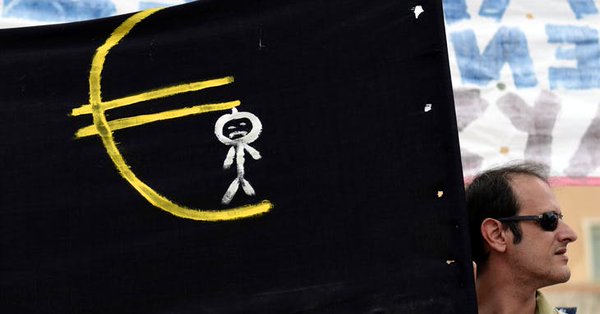The European Union Court delivered its verdict: European citizens cannot be allowed to find out whether the ECB acted legally in closing down Greece’s banks in June 2015. Why? In the wording of the three judges, because such disclosure would affect the ECB’s “space to think in 2015 and also after 2015”. If this sounds like an Orwellian decision, it is because it is an Orwellian decision.
Yanis Varoufakis is co-founder of the Democracy in Europe Movement, DiEM25, an economist, and former Greek finance minister. He is currently a candidate for the EU Parliament in Germany for European Spring.

On 29th June 2015 the ECB decided to close down Greece’s banks. Why? The ECB acted in a naked attempt to prevent the newly-elected Greek government from renegotiating the country’s public debt, fiscal policy and reform agenda. Using Greece’s banks, instead of its… tanks, the ECB spearheaded a coup d’ etat against a democratically elected pro-European government on behalf of its troika of lenders.
The legal opinion
The ECB must have been so worried about the legality of its heavy-handed actions that it commissioned a legal opinion from a private law firm, which it paid for with public funds.
Our petition
Together with MEP Fabio de Masi, we petitioned the ECB to release this legal opinion. Mr Mario Draghi, ECB President, refused arguing that confidentiality prevented him from releasing the legal opinion. We retorted that confidentiality applies to the law firm but not to its client – the ECB, that commissioned the legal opinion on behalf of Europeans, has a duty to release it. We asked Mr Draghi publicly:
“Mr Draghi, if you acted legally, according to EU Law and the ECB charter, why do you not release the legal opinion you commissioned over the ECB’s actions that led to the closure of Greece’s banks?”
Following the ECB’s continued refusal to release the legal opinion, we took the matter to the EU Court and also began a petition that gathered more than thirty thousand signatures.
The EU Court’s full adoption of the ECB’s refusal – and language
The three judges of the EU Court delivered their verdict on Tuesday 12th March 2019, as follows:
“Contrary to the applicants’ claim, the ECB could legitimately take into account the hypothetical effects that the disclosure of the contested document could have on its space to think in 2015 and also after 2015”
In short, the three judges disgraced themselves by copy-pasting the ECB’s claims as their judicial verdict, without a smidgeon of a legal explanation of the merits of the ECB’s position. The argument that if European citizens could read the legal opinion on the legality of the ECB’s action would limit the ECB’s “space to think” does not deserve even a rebuke.
We shall appeal the verdict and take the matter to the European Court of Justice
What the events of the summer of 2015 reveal is the exorbitant power of the ECB to close down a Eurozone country’s banks. Exercising this power with decisions made behind closed doors and on the basis of undisclosed arguments is inconsistent with European democracy. The least Europeans can expect is access to legal opinions that they have paid for regarding the exercise of the ECB’s enormous power.
This is why MEP Fabio de Masi and myself will appeal the EU Court decision to the European Court of Justice. Failing to do so would be an enormous gift to the eurosceptic Nationalist International that is feeding of the EU’s incompetent authoritarianism.


Be the first to comment